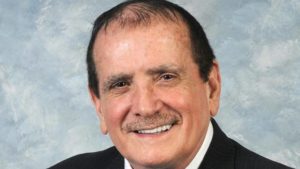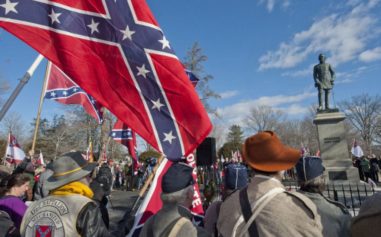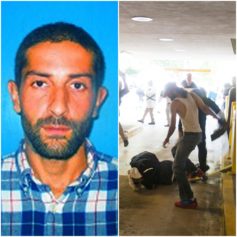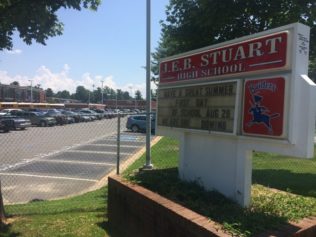
Under Rep. C. Wesley Morgan’s bill, impeding traffic on a public road during a protest would be a crime punishable by up to a year in jail. (Image courtesy of the Lexington Herald-Leader)
A Kentucky lawmaker says it was the deadly Charlottesville violence that prompted him to introduce a controversial new bill offering legal protections to drivers who “unintentionally” hit and/or kill protesters during unauthorized demonstrations.
A bill pre-filed by Rep. C. Wesley Morgan earlier this year would, in part, make impeding the flow of traffic on a public street during a protest, for which no permit has been granted, a Class A misdemeanor. Fair enough, right?
However, the provision that particularly drew the ire of fellow lawmakers, concerned constituents, and activists is that the bill would make it so that drivers, “may not be held criminally or civilly liable for causing injury or death to a person” who’s blocking traffic during such an event — unless it’s proven the driver did so intentionally. Fellow lawmakers have pegged the bill as nothing short of “immoral.”
“If you were driving on the way to pick up your kids and a protester runs into the road and you end up hitting or injuring them, would it be fair to you for them to turn around and sue you?” the lawmaker asked.
In an interview with ABS, Morgan justified his stance on filing the bill and maintained that it is not an all-out call for motorists to mow down protesters without consequence, as he says the local media has made it out to be. He explained that the legislation is four-pronged and designed to protect both drivers and demonstrators. However, there are still critics who feel Morgan is pandering to a certain “base” with his legislative priorities.
The first part of the Republican lawmaker’s “Right to Drive” bill would make the disruption of a public protest a Class A misdemeanor, punishable by up to a year in jail. Those found within 50 feet of a public protest either 1.) concealing their identities with a mask, hoodie or other face covering, or 2.) outfitted in “protective gear and carrying a “deadly weapon” would be charged with disruption.
Some critics have argued that such a provision seemingly targets anti-fascist protesters, better known as Antifa, who conservatives have pegged as left-wing extremists. Members of the group, often clad in all black sporting face coverings, showed up as counterprotesters to the white nationalist–backed “Unite the Right” rally in Charlottesville, Va. on Aug. 11 and 12.
Rally-goers and counter-protesters clashed in the streets, resulting in the death of 31-year-old Heather Heyer, who was killed after a Neo-nazi rammed his car into a crowd of counter-protesters. It should be noted that the racist ralliers had a permit to protest but the counter-protesters did not.
Morgan said it was these acts of violence that inspired the bill. Morgan insists that the driver in the Charlottesville incident would still be charged under his sponsored legislation because the driver drove his vehicle into that group of protesters with intent to harm/kill.
Lastly, the lawmaker’s proposed legislation states, “any person, including a public servant, who … prevents a police officer from exercising official duties” during a public demonstration can also be charged with a Class A misdemeanor if that event results in some sort of physical harm or damaged property.
Similarly worded “right-to-drive” bills began popping up after several Black Lives Matter protests sparked by the 2014 fatal police shooting of Black teen Michael Brown. Demonstrators blocked the roads at times during the fiery protests. However, the legislation really started gaining steam after Heyer’s death. Lawmakers in several states, including Tennessee, Texas and North Dakota, have proposed similar bills to protect drivers who “accidentally” hit protesters. So far, none of them have passed.
Morgan said the Kentucky’s legislative session doesn’t begin until Jan. 2 for the General Assembly to vote on it.


